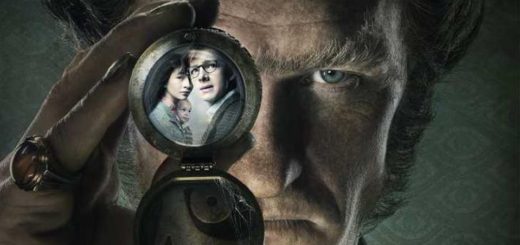TIN STAR Season One Review

Ah, Western television. I used to revere what I thought was a diverse selection of shows that appeared much more sophisticated than the telenovelas back home in the Philippines, but I realize now that much of it is just a retelling of similar characters and tropes loved by other audiences. TIN STAR is another crime-drama that follows the life of a protective but flawed father (except in this one he’s got a British accent). The series does well boasting tons of gruesome violence, but ultimately fails to provide any real message or theme. It contains all of what a revenge crime show needs, but misses many emotional marks. However, it manages to stay afloat by hanging onto shocking plot twists and noteworthy performances.
TIN STAR follows the Worth family and their lives in a remote mountain town akin to David Lynch’s TWIN PEAKS. After the Worth family move into Little Big Bear, they struggle to readjust to their new life in the town’s quiet, isolated space. Life initially seems easy and quite dull for the newly-sober sheriff Jim Worth (Tim Roth) and his family, but that eerie tranquility gets shaken up by the arrival of a massive oil company, North Stream Oil. The refinery’s shady, totalitarian control over the town irks Sheriff Worth, but his wariness creates trouble for him, as it seems that the oil company will kill off anyone who questions them.

Corduroy Jacket – $40, Abercrombie and Fitch; Single-Shot Shotgun – $60, Urban Outfitters
All of the above is revealed during the first episode. The pilot spews so much backstory without giving a real sense of what the show is about that by the end of the episode, all I really am is lost. It seems that as crime and corruption seep into the once idyllic town, Sheriff Worth must race to find the puppeteer of all the apparent “suicides” and stop them before more cynical townspeople are harmed. Though this is barely touched on for another few episodes, which move on to focus on Worth’s return to alcoholism and the repercussions of a tragic family incident. There are too many different elements that don’t fit together coherently—ultimately, it forms a disjointed narrative that loses much of its already-paltry novelty to muddled messes. It doesn’t help that these strange events unfold with wonky pacing and overly dramatic music.
What’s interesting in the show is the Worth family dynamic and how it contradicts itself time and again. Every character either supports or betrays each other by the minute. Grieving mother Angela Worth (Genevieve O’Reilly) kicks Jim out for his return to inebriation in one episode, but then brings him two bottles of whiskey for them to down together in the next. Much of the strange family tension and tribulations arise from Jim’s alcohol binges and his violent alter-ego Jack Devlin who surfaces every time he blacks out. Jim starts out the series sober, serious, and stultified. As he stumbles down liquor lane, his values and morals are tested, but he never seems to learn anything from his drunken mishaps and mistakes. Jim’s modern day Jekyll and Hyde persona—portrayed impressively by Roth—pave the way for more sinister complications that make for a good plot. However, it does become tiresome when Worth never seems to grow as a character. It’s clear that Jim loves his family and wants to protect them, but does so in the strangest of ways. Perhaps the strangest (and most cringe-worthy) is when he threateningly asks his daughter’s new fling if he was “gentle” when he “fucked [his] daughter.”

Me trying to sit through enough episodes to write this review
While I don’t necessarily identify with Jim (or Jack), his daughter Anna (Abigail Lawrie) kept me watching. She was the only one I felt real sympathy for—all the other characters, while tragic things no doubt happen to them, are too stiff, selfish, and contrived for me to care. Anna takes initiative in taking care of her family while struggling to be alone in the middle of all the chaos her father causes. Jim disappoints her again and again, but she still stands up for him when it counts. And while I loved that about her, it also stands as an example of how TIN STAR repeatedly sidelines the women and their lives in favor of Jim’s tribulations and drunken antics. I keep seeing the promise of Angela or any of the others getting more depth than just remaining as the victims, but the show fails to provide any real redemption for them that lasts more than a scene or two.

TIN STAR: “We’re renewed for Season 2.”
Me: ^
TIN STAR does have some shocking plot revelations that hooked me in episode to episode, but I often found myself dozing off in the middle of every other scene. I just kept waiting for the series to pick up, and it never really did. This show isn’t terrible—at times it’s even pretty interesting—it just isn’t much to write home about. And while it does exhibit some interesting camera techniques to depict Jim’s subjective demons, the show fails to spin its narrative in a cohesive and succinct manner. It’s really kind of sad when shows with great potential such as this fail to match or exceed expectations.
Series creator Rowan Joffé intended for TIN STAR to touch upon classic cinematic themes such as revenge, grief, illicit love, and corruption, featuring amoral characters on dangerous paths of self-discovery. And while it effectively shapes the world of a sleepy town full of paranoia and grief, it fails to create characters compelling and sympathetic enough to keep me engaged past the first 20 minutes. There are certain plot lines that drew me in with each new revelation, but I soon found that it was good for nothing other than shock value. And at the end of it all I just sat there thinking about how much better this show would have been as a drinking game where you take a shot everytime Sheriff Worth does.
Verdict: Do Not Recommend



